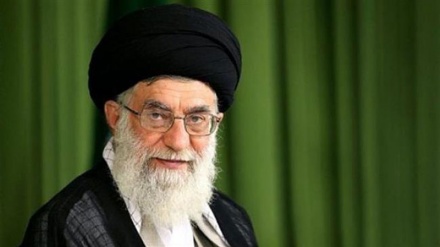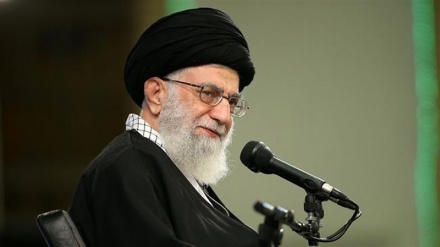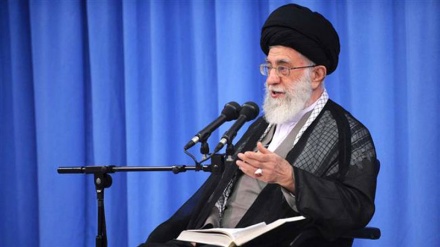In Presence of the Sun (77)
Everybody is duty- bound to be engaged in a job and profession and avoid laziness and idling around. Imam Sadeq (AS) says, “He who doesn’t work and has just contented himself with worship of God, his prayer won’t be accepted by God.”
Ayatollah Khamenei says on the status and value of workers, “If the value of a worker is understood in society all those who enjoy a bounty of the society will consider themselves obliged to the worker.”
A worker is a person who spends his ability in the way of his fellowmen to gain money. Such a person is highly revered in Islam to the extent that once the Prophet kissed the hand of a worker and said, “The fire of hell will not touch these hands.”
In the view of Islam all Muslims have to be engaged in a job and profession. Imam Ja’afar Sadeq (Peace upon him) said, “The Commander of the faithful Ali (AS) used to shovel the ground and revive the land and he delivered many slaves by what he had gained painstakingly.”
The Messenger of Mercy, Prophet Mohammad (SAWA) regarded the workers’ status with reverence and respect. He said, “All of you work but take heed that everyone has been created for a job which he does it easily. In the view of Islam, the worker has the duty to do what he has assumed in the best way and not defer it.”
While the leaders, saints and great figures of Islam used to work, how can a Muslim be indifferent to labor and making effort? If the culture of working is strengthened and the value and status of the worker is preserved the outcome will be innovation, creativity, growth and development.
Ayatollah Khamenei calls workers as important strata of society and believes that they are effective elements which can take the country toward independence. The Leader describes the farmers and industrialists as the able arms which push the country forward to independence and self-sufficiency.
The view of Islam on the rights of the worker and employer is so comprehensive that it by far surpasses the manmade laws of the modern world. The Prophet says, “One of the rights of the worker on the employer is that he should maintain the food and clothes of the worker properly and should not exhaust his worker with excessive workload.”
Elsewhere, he said, “The employer is duty-bound to pay the salary of the worker before the sweat of his forehead dries.”
Imam Sajjad (AS), the 4th infallible heir of the Prophet of Islam elaborates on the rights of the worker and employer in his Treatise of Rights, “It is an obligation on the employer to overlook the mistakes and disobediences of the worker; pay his salary fully; not behave haughtily with him but behave him justly and observe fairness in determining his wages.”
Suleiman Ja’afari, a companion of Imam Reza (AS), said, “I entered the house of Imam Reza with him. He saw that his servants were planting flowers and a black worker was working along with them. The Imam asked, ‘Who is he?’ His servants answered, ‘We have brought him to help us at work.’ The Imam said, ‘Have you determined his salary?’ They said, ‘No, he is satisfied with whatever we give him.’ The Imam got very angry. I went close to him and said, ‘May I be your ransom! Why are you upset?’
The Imam answered, ‘I have prevented them from employing somebody unless they determine his salary. O Suleiman, know this that if a worker works for you without determining the salary he will think that you have paid him less even though you pay him threefold. But if you determine his salary he will be thankful when you pay him the same. And if you pay him more he will understand that you have paid him further.”
Another important law in Islam is to avoid disturbing the worker. Imam Sajjad (AS) states, “The right of your inferiors on you is that you should know their weaknesses and your power is the reason for your dominance over them. Hence, you should behave them justly and be like a kind father to them. Forgive their ignorance and mistake, not hasten in their punishment and be thankful to God for the position of employer He has granted you.”
Imam Sajjad (AS) prevents from disturbing workers, saying, “The right of the one who does your works is that you should know God has created him and you are not his owner and creator and his sustenance is not in your hand. So, do him good and don’t disturb him.”
Prophet Mohammad (SAWA) elaborating on refusal of paying the salaries of workers, considered it as a great sin and said, “He who is unjust in paying the salary of the worker God will obliterate his good deeds and will deprive him of the sweet smell of paradise.”
In view of this, the Leader of the Islamic Revolution believes that both the capitalist and socialist systems maintain an oppressive and hostile relation between the worker and the employer. He says, “The view of Islam is the view of cooperation. They are two elements that, when combined, they will create work. Unlike the leftist and Marxist view that used to consider everything as contradictory- and thank God has perished from the scene of philosophical thoughts of the world- the view of Islam is the view of convergence, the view of cooperation. The two elements, instead of being in contrast, will converge to create a third being. This is the view of Islam, the view of nature, the view of divine law and the laws of creation. This is the same in all phenomena of the world; from the natural phenomena to political phenomena to historical, economic and non-economic ones. The Islamic view is against the Marxist view of contrast. It is the view of convergence, coalition, marriage, cooperation and conformity. It is true on the worker and employer, too. They are two elements which should take hand in hand to create work and production. The worker cannot do anything without the employer. The employer cannot do anything without the worker, either. If these two are put by each other and define a healthy, moral and humane relation between one another then the climate will be that of expansion of production. Besides financial progress, there will be spirituality, too. This is our view. We neither consider the employer damned and outcast as the leftist current did; nor, like the rightist current, do we consider him as the king with full authority. The employer can be a noble person. When he really cooperates he is really noble. A noble element beside another noble element (worker) move hand in hand as per the Islamic and humane relations. This is the basis of work. Everybody should work in this direction.”
RM/ME


